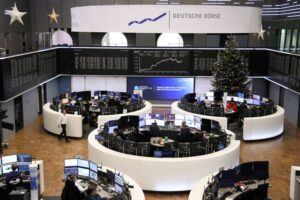European Stock Markets Face Caution Amid Economic Concerns and U.S. Political Uncertainty
European stock markets ended a holiday-shortened week on a slightly negative note, with traders closely monitoring economic data for insights on interest rate trajectories and potential shifts in U.S. policies coinciding with the impending Donald Trump presidency.
The pan-European STOXX 600 index reflected this caution, dipping by 0.2% as of early Friday, even though it was forecasted to achieve a modest 0.7% rise over the week, buoyed by light trading activity as markets adjusted post-New Year. In individual markets, Swiss stocks saw a mild increase of 0.2%, while Germany’s DAX declined by 0.3%, and France’s CAC 40 fell by 0.6%.
A particular focus has emerged on sectors heavily exposed to the Chinese economy, including mining, luxury goods, and automotive industries. These sectors experienced pressure despite a recent announcement from Beijing mentioning a significant increase in funding through ultra-long treasury bonds in 2025. This initiative aims to stimulate business investments and enhance consumer spending, potentially mitigating some of the underlying economic anxieties.
Investor sentiment remains tinged with apprehension regarding China’s economic stability and the potential for a renewed trade conflict with the U.S. ahead of Trump’s inauguration on January 20. This cautious outlook contrasts starkly with the strong performance of U.S. stock markets throughout 2024, which saw significant gains fueled by optimism surrounding artificial intelligence advancements and a series of interest rate cuts by the Federal Reserve.
Despite reaching record highs last year, the STOXX 600 has faced headwinds from concerns surrounding a decelerating European economy and political turbulence in Germany and France. As quoted by Susannah Streeter, head of money and markets at Hargreaves Lansdown, “Given the super-stellar year for U.S. stocks in 2024, it’s not surprising a bit more caution has crept in amid uncertainty about monetary policy, especially with unpredictable changes from the White House expected.”
Market participants are keenly awaiting upcoming data release on U.S. manufacturing activity, alongside speeches from key officials at the Federal Reserve and the European Central Bank (ECB). ECB policymaker Yannis Stournaras indicated expectations of a reduction in the bank’s primary interest rate to 2% by the fall, aligning with traders’ anticipations of further easing measures.
In the labor market segment, recent figures from Germany’s Federal Labor Office showed an increase in unemployment numbers, though it was less than analysts had projected for December.
Stock-specific movements also caught attention, with Tullow Oil soaring by 12% following news of exemption from a significant $320 million tax burden related to its Ghanaian operations. Conversely, Luxembourg-based steel giant ArcelorMittal saw a decline of 3.6%, responding to reports that U.S. President Joe Biden has moved to officially block Nippon Steel’s proposal to acquire U.S. Steel.
As investors navigate the complexities of both international markets and domestic policies, staying informed is critical. Keep an eye on the evolving economic data and political landscape, as these factors will undoubtedly shape the market’s trajectory in the coming weeks. At Extreme Investor Network, we are committed to providing you with the insights and tools necessary to make informed investment decisions in this dynamic environment.

